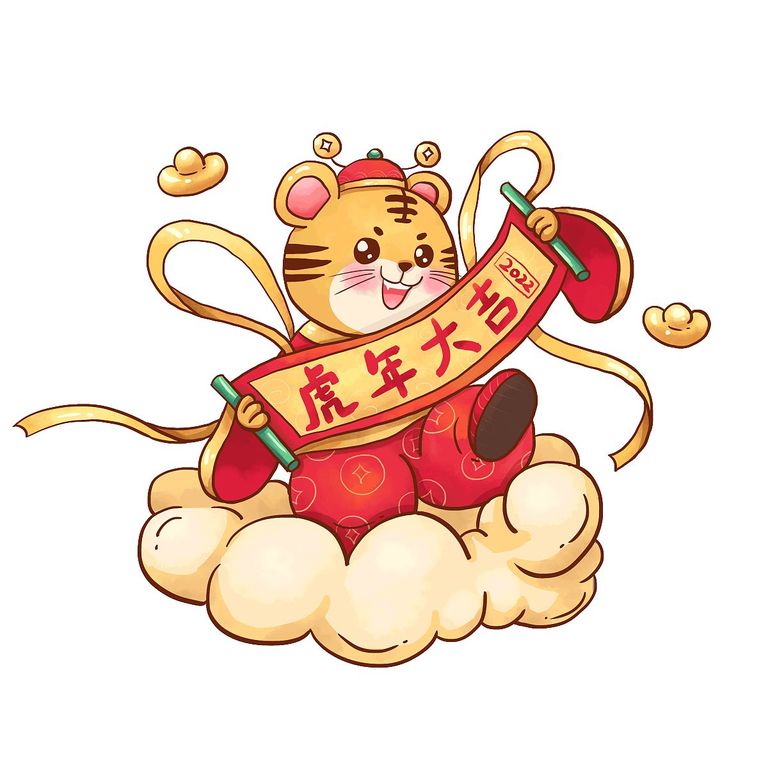
Tomorrow is the most important traditional festival in China - the Spring Festival, which is what the common people call the Lunar New Year. Tomorrow is the last day of the lunar year. Tomorrow night is the New Year's Eve. The New Year’s Eve usually falls on December 29 or 30 of the lunar year. During the Lunar New Year, every family is busy in cleaning the house, putting on lanterns and decorations, pasting Spring Festival couplets, setting off fireworks and firecrackers, welcoming their ancestors home for the new year, eating jiaozi (stuffed dumpling) and so on.
No matter where you are, you will also return home to reunite with your family. It is no wonder that hundreds of millions of people return home during the Spring Festival in China.
1.The origin of the Spring Festival
Of course, the Spring Festival is to welcome the arrival of spring with various activities on the last day of the lunar year, such as offering sacrifices to heaven, ancestors, praying for blessings, getting rid of the old and welcoming the new, family reunion and so on.
There is a legend that has been handed down to this day. It is said that in ancient times, there was a beast called "Nian", which would come out on the last night of the Lunar New Year to hurt people. On the last day of the Lunar New Year, ordinary people will prepare various means to combat "Nian". If after New Year’s Eve, "Nian" didn't come to hurt people. The next morning, people would say hello to each other - "Happy New Year", which means that they had survived from the beast "Nian". Over time, the custom of the New Year has been formed.
2.Customs of the Spring Festival
(1)Pasting Spring Festival couplets
At first, the peach wood charms were hung at the door of the house, because the peach wood is red and has the function of warding off evil spirits. Spread to this day, it evolved into pasting Spring Festival couplets on both sides of the gate, using red paper instead of the ancient peach wood charms. It means to frighten the monster “Nian”.
(2) Setting off fireworks
Setting off fireworks and firecrackers on New Year's Eve, originally used to frighten and drive away the monster “Nian”, was gradually evolved into a celebration of the New Year.
(3) Eating dumplings
On New Year's Eve, even people no matter how difficult they are will eat stuffed dumpling on New Year's Eve, and the whole family will sit together and have a family reunion.
(4) Staying up late or all night on New Year's Eve
On New Year's Eve, the whole family doesn't sleep, and the lights are bright. They welcome the arrival of the Lunar New Year together. After New Year’s Eve, everyone naturally grows a year old.
(5)Extending New Year’s greetings
After New Year’s Eve, that is, the first day of the New Year, relatives, friends and neighbors should greet each other and say "Happy New Year". In particular, the younger generation should pay New Year's greetings to the elders, and the custom of kowtowing is still popular in some places.
Of course, there are many customs, and there are some differences in different places, but one thing remains the same: the Spring Festival (Chinese New Year) symbolizes a kind of harmony, reunion and people's longing for a better future.
明天就是中国最重要的传统节日——春节,也就是老百姓所说的过年。明天是农历(阴历)的最后一天,明天晚上就是除夕,又称大年夜、除夕夜、除夜等。除夕因常在农历十二月廿九或三十日,故又称该日为大年三十。在除夕这一天,家家户户忙忙碌碌或清扫庭舍,张灯结彩,贴春联,燃放烟花爆竹,迎祖宗回家过年,吃团圆饭等。
无论身处何方的游子,也都会回到家里与家人团圆,也就不难解释中国春运大潮数亿人的流动。
一、春节(过年)的由来
春节当然是为迎接春天的到来而在农历年的最后一天举行各种各样的活动,如祭天、祭祖、祈福,除旧迎新,家人团聚等。
有一种流传至今的传说,说古时有一种猛兽叫“年”,会在农历年的最后一天晚上出来伤害人。老百姓会在农历年的最后一天准备好各种手段来对付“年”。过了除夕夜,“年”没有来伤害人,第二天早上人们相互问安——“过年好”,意思是度过了“年”这一关。久而久之,就形成了过年的习俗。
二、春节(过年)习俗
1.贴春联
最初是在家门口挂的是桃符,因为桃木是红色的,具有辟邪的作用。流传至今,演变成在大门两侧贴春联,用的是红纸,代替了古时的桃符。意思是用来对“年”这阵怪兽起到震慑作用。
2.燃放烟花爆竹
除夕夜燃放烟花爆竹,原来是用来吓唬驱赶怪兽“年”的,渐渐演变成一种迎新年的庆祝活动。
3.吃饺子
除夕之夜,即使生活再难的人家,也要在除夕夜吃上一顿热气腾腾的饺子,而且是一家人围坐在一起,家人团聚。
4.守岁
除夕晚上,也就是大年三十晚上,一家人都不睡觉,而且灯火通明,不能把灯火息掉,一同迎接农历新年的到来。除夕过后,每个人自然就长了一岁。
5.拜年
除夕过后,也就是大年初一,亲朋好友,街坊邻居,都要互致问候,说一声“过年好”。特别是晚辈要给长辈拜年,有的地方还流行叩头的习俗。
当然,还有许许多多的习俗,而且各地也有一些不同,但有一点是不变的,那就是春节(过年)象征着一种和谐、团圆和人们对美好未来的向往。

注:图片来自网络。
(Note: Photos are taken from the INternet.)
Congratulations, your post has been curated by @dsc-r2cornell. You can use the tag #R2cornell. Also, find us on Discord
Felicitaciones, su publicación ha sido votada por @ dsc-r2cornell. Puedes usar el tag #R2cornell. También, nos puedes encontrar en Discord
Many thanks to you.
:::Discord :::Whatsapp:::Telegram :::Facebook Page
Thanks a lot.
春節快樂